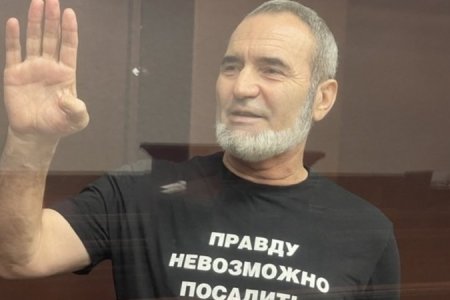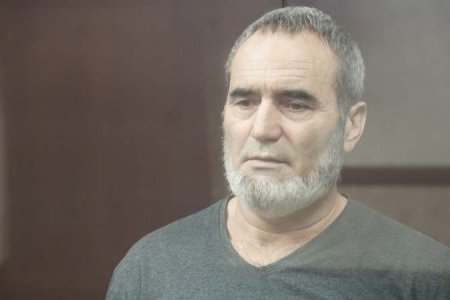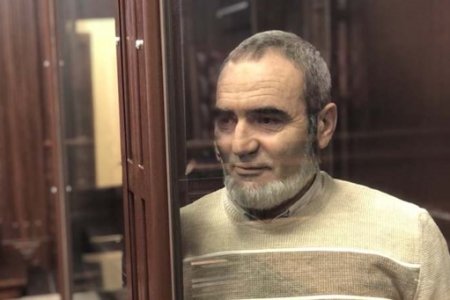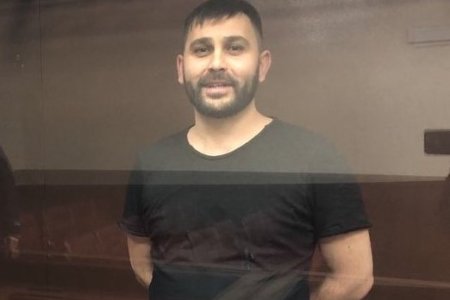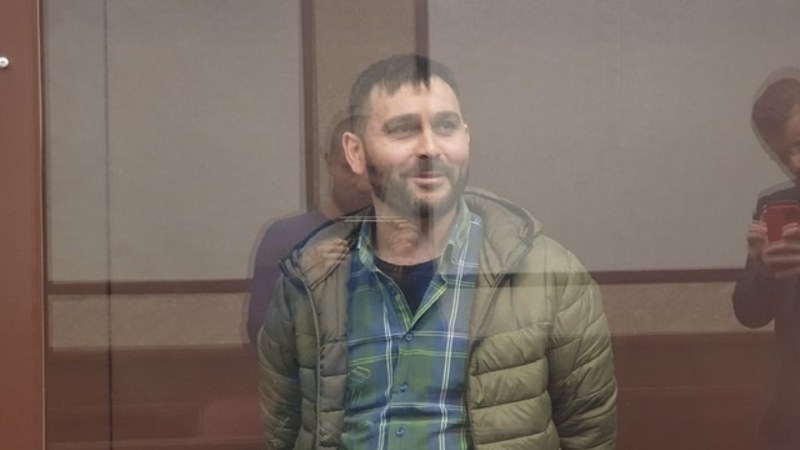
A Russian prosecutor has demanded an 18-year sentence against Marlen Mustafayev, a civic activist who had previously faced persecution for protesting against the politically motivated prosecutions of other Crimean Tatars. Prosecutor Vladislav Kuznetsov claimed such a term of imprisonment in the worst of Russian penal institutions was warranted after a fast-track ‘trial’ in which the fabricated charges and alleged ‘evidence’ were all copy-pasted from previous ‘trials’ of other Crimean Tatar political prisoners, including two of the three members of one family that Russia has imprisoned without any crime.
Marlen Mustafayev is a father of two who supported his family by working as a car mechanic, while also taking part in organizing Muslim funeral rites. He had actively attended political trials in occupied Crimea and helped the families of the ever-mounting number of Crimean Tatar and other Ukrainian political prisoners. From 2017, he was involved in the vital Crimean Solidarity human rights movement which has come under particular fire from the Russian occupation regime and FSB [Russian security service]. He was one of around 100 Crimean Tatars prosecuted and fined in December 2017 following peaceful single-person pickets in support of political prisoners.
Russia has been persecuting civic activists and journalists since its invasion and annexation of Crimea, and Mustafayev is one of very many Crimean Solidarity activists, who first faced administrative prosecutions, and then, when they refused to be cowered, were arrested on fictitious ‘terrorism’ charges. The prosecution in Mustafayev’s case is especially suspect as he was only arrested on 9 February 2022, although the charges were effectively identical to those against four other recognized political prisoners, three of whom were arrested back in June 2019. How can ‘terrorism’ charges be justified if the FSB took almost three years before it arrested Mustatayev?
After such apparently baffling delay, the Russian prosecution then demonstrated record haste in getting the ‘case’ to trial and to near its essentially predetermined sentence. The behaviour of presiding judge Roman Plisko, from Russia’s notorious Southern District Military Court in Rostov has given no reason to doubt that the panel of three judges will ignore the lack of any substance to the charges and pass the sentence demanded.
At the beginning of the court debate on 15 November, prosecutor Kuznetsov claimed that Mustafayev’s ‘guilt’ had been proven. He asked that the first five years of the 18-year sentence demanded be in a prison, the very worst of Russian penal institutions, with the rest in a harsh-regime prison colony, which will be thousands of kilometres from his family and hope in occupied Crimea.
Like Enver Omerov (b. 1961); his son Riza Omerov (b. 1988); Aider Dzhapparov (b. 1980); and Azamat Eyupov (b. 1963), Marlen Mustafayev is accused of ‘terrorism’ without any recognizable crime even being impugned. The charges pertain solely to unproven involvement in the peaceful transnational Hizb ut-Tahrir Muslim organization which is legal in Ukraine and which is not known to have committed any acts of terrorism or violence anywhere in the world. The Russian Supreme Court ruling in 2003 which declared Hizb ut-Tahrir a ‘terrorist’ organization was deliberately kept secret until it was too late to challenge it, and Russia has never provided any convincing justification for the decision. The other four men were recognized by the Memorial Human Rights Centre as political prisoners (before Russia formally dissolved the NGO), and the same arguments apply in equal measure to the prosecution of Marlen Mustafayev.
The only variable in this conveyor belt persecution is whether the FSB claim that the person they arrest ‘organized’ a purported Hizb ut-Tahrir group, or merely took part in it. The distinction often seems very arbitrary, but it carries a difference in sentence of five years or more. In this ‘case’ Mustafayev was, like Enver Omerov; Aider Dzhapparov; and Azamat Eyupov before him, charged with being an ‘organizer’, under Article 205.5 § 1 of Russia’s criminal code and also accused of ‘planning to violently seize power’, under Article 278. As noted by Memorial HRC, the arguments used to justify this second charge are identical to those used for the ‘terrorism’ charge, and seem clearly aimed only at propaganda and at justifying huge sentences. The situation is surely grotesque when Eyupov, who was only arrested on 7 February 2021, and Mustafayev, a full year later again, are accused of having been ’organizers’ years after the first arrests. There is also another shocking aspect to Eyupov’s case since the FSB mixed up his voice with somebody else’s and he was not present at the meeting used to justify the charges.
The alleged ‘evidence’ used in such prosecutions is as flawed as the actual charges. In Mustafayev’s case, as in many others, the FSB planted so-called ‘prohibited religious literature’ during the armed search and arrest. In all such cases, the men’s lawyers are prevented from being present, with Russian courts guaranteed to ignore both the illegality of blocking access to lawyers, and testimony that the books were planted. This is despite the fact that the FSB generally leave the books in places which no devout Muslim would use to keep religious material.
The rest of the ‘proof’ is equally dubious, with FSB-loyal ‘experts’ essentially willing to claim whatever is required to ‘prove ‘involvement’ and the main ‘evidence’ provided by anonymous ‘witnesses’. There is no proof of any danger to justify allowing witnesses to appear in secret, so it is especially shocking that such ‘testimony’ is often the main part of the prosecution’s case. The court goes along with this, although the alleged ‘witnesses’ often appear to be reciting what they have learned off by heart; and cannot answer the simplest question proving that they genuinely know the defendant. It is, in fact, clear that the court is well-aware that such ‘testimony’ is fraudulent, since it regularly blocks defence questions aimed at demonstrating that these alleged ‘witnesses’ are lying.
On 12 January 2021, the same Southern District Military Court sentenced Enver Omerov to 18 years’ imprisonment; Aider Dzhapparov to 17 years; and Riza Omerov to 13 years. Enver Omerov’s son-in-law, Rustem Ismailov, was already serving a 13.5 year sentence on identical charges. Those sentences were upheld at appeal level.
On 18 July 2022, the same court (but different ‘judges’) sentenced Azamat Eyupov, a veteran of the Crimean Tatar national movement, to 17 years’ imprisonment with the charges and ‘evidence’ all the same, only Eyupov’s voice not present on the illicitly made tapes. Eyupov is already 59 and in very poor health and there is next to no chance that he would survive the sentence.
Marlen Mustafayev is the latest to be ‘tried’ in a case known as the Bilohirsk case [Russian: Belogorsk). It is more than likely that he will not be the last. The Russian FSB get bonuses or promotion for such arrests, and they require next to no work. The Russian FSB can claim they are ‘fighting terrorism’ while needing to do nothing more than simply copy-paste a document or two.
Please write to Marlen Mustafayev, and, if possible, to one or two of the other men! Letters show them that they are not forgotten, and ensure that both the prison staff and Moscow know that their actions are under scrutiny. Letters need to be in Russian, and on ‘safe’ subjects. If that is a problem, use the sample letter below (copying it by hand), perhaps adding a picture or photo. Do add a return address so that he can answer.
Sample letter
Здравствуйте,
Желаю Вам здоровья, мужества и терпения, надеюсь на скорое освобождение. Простите, что мало пишу – мне трудно писать по-русски, но мы все о Вас помним.
[Hi. I wish you good health, courage and patience and hope that you will soon be released. I’m sorry that this letter is short – it’s hard for me to write in Russian., but you are not forgotten. ]
Marlen Mustafayev
Address
344022, Россия,, Ростовская обл., г. Ростов-на-Дону, ул. Максима Горького, 219, ФКУ СИЗО-1
Мустафаеву, Марлену Рамисовичу, г.р. 1988
[Or in English
344022 Russian Federation, Rostov on the Don, 219 Maxim Gorky St, SIZO-1
Mustafayev, Marlen Ramisovych, b. 1988 ]
Azamat Eyupov
344022, Россия,, Ростовская обл., г. Ростов-на-Дону, ул. Максима Горького, 219, ФКУ СИЗО-1
Эюпову, Азамату Серверовичу, г.р. 1963
[Or in English
344022 Russian Federation, Rostov on the Don, 219 Maxim Gorky St, SIZO-1
Eyupov, Azamat Serverovich, b. 1963 ]
Aider Dzhapparov
РФ, 457670 Челябинская обл., г. Верхнеуральск, ул. Северная 1, Тюрьма по челябинской области
Джаппарову, Айдеру Энверовичу, 1980 г.р.
[Or in English:
Russia, 457670 Chelyabinsk oblast, Verhneuralsk, ul. Severnaya 1, Prison
Dzhapparov, Aider Enverovych, 1980 ]
Enver Omerov
РФ, 600020, Владимир, ул. Большая Нижегородская, д. 67, Тюрьма № 2
Омерову, Энверу Викторовичу, 1961 г.р.
[In English: Russia, 600020, Vladimir, Bolshaya Nizhegorodskaya St. 67, Prison No. 2
Omerov, Enver Viktorovich, b. 1961 ]
Riza Omerov
РФ, 662606, Красноярский край, г. Минусинск, ул. Горького, 114.
Омерову, Ризе Энверовичу, 1988 г.р.
[In English: Russia, 662606, Krasnoyarsk Kraj, Minusinsk, ul. Gorkovo, 114,
Omerov, Riza Envirovych, b. 1988 ]
